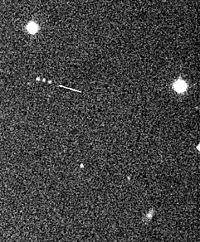Paaliaq facts for kids

Time lapse of Paaliaq moving along its orbit that lead to its discovery
|
|
| Discovery | |
|---|---|
| Discovered by | Brett J. Gladman et al. |
| Discovery date | in 2000 |
| Designations | |
| Saturn XX S/2000 S 2 |
|
| Orbital characteristics | |
| Epoch 2000 Feb. 26.00 | |
| 15.200 Gm | |
| Eccentricity | 0.3631 |
| 686.9 d (1.88 yr) |
|
| Inclination | 45.083° |
| Physical characteristics | |
| Dimensions | 22 km |
| Albedo | 0.04 assumed |
|
Spectral type
|
red B−V=0.86, R−V=0.40 D |
Paaliaq is one of the many moons orbiting the planet Saturn. It is not perfectly round like Earth's Moon. Scientists found Paaliaq in October 2000. It was first called S/2000 S 2.
A team of astronomers discovered this moon. They included Brett J. Gladman, John J. Kavelaars, Jean-Marc Petit, Hans Scholl, Matthew J. Holman, Brian G. Marsden, Philip D. Nicholson, and Joseph A. Burns. In 2003, it was named Paaliaq. The name comes from a shaman character in a book by Michael Kusugak. He provided names from Inuit mythology for several of Saturn's moons.
About Paaliaq
Paaliaq is a small moon. It is about 22 kilometers (14 miles) wide. This is roughly the size of a small city. It travels around Saturn at a distance of about 15.2 million kilometers (9.4 million miles). One full trip around Saturn takes Paaliaq about 687 days. This is almost two Earth years.
The Inuit Group
Paaliaq belongs to a group of Saturn's moons called the Inuit group. These moons are not round. They are thought to have formed in a similar way. Other moons in this group include Kiviuq and Siarnaq.
These moons, including Paaliaq, have a light-red color. This color gives scientists a clue. It suggests that the Inuit group moons might have once been part of a larger object. This bigger object likely broke apart a long time ago.
Images for kids
See also
 In Spanish: Paaliaq (satélite) para niños
In Spanish: Paaliaq (satélite) para niños


